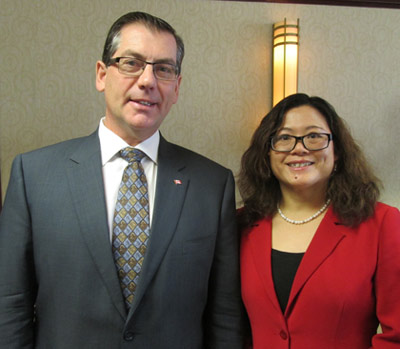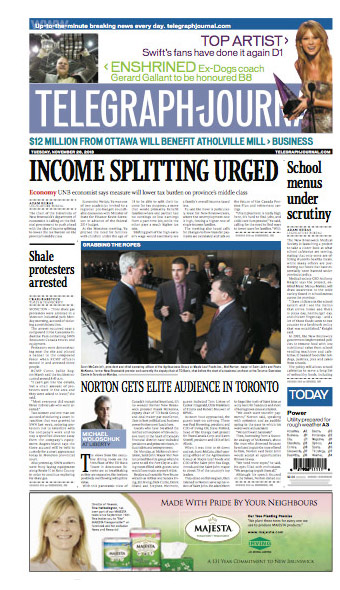UNB economist provides economic advice to finance minister
Author: Communications
Posted on Nov 27, 2013
Category: UNB Fredericton , UNB Saint John
 Economist Weiqiu Yu joined a team of experts in Moncton, N.B. last week in a pre-budgetary consultation held my Minister of State for Finance Kevin Sorenson.
Economist Weiqiu Yu joined a team of experts in Moncton, N.B. last week in a pre-budgetary consultation held my Minister of State for Finance Kevin Sorenson.
Dr. Yu, chair of the University of New Brunswick’s economics department in Fredericton was one of two academics invited to the policy discussion.
You can read Adam Huras’ story on the front page of the November 26 edition of the Telegraph Journal.
Economist calls for income splitting
ADAM HURAS
Telegraph Journal
26 Nov 2013
The chair of the University of New Brunswick’s department of economics is calling on the federal government to push ahead with the idea of income splitting to lower the tax burden on the province's middle class.
Economist Weiqiu Yu was one of two academics invited to a regional pre-budget roundtable discussion with Minister of State for Finance Kevin Sorenson in advance of the federal 2014 budget.
At the Moncton meeting, Yu pitched the need for families with children under the age of 18 to be able to split their income for tax purposes, a move that would primarily benefit families where one partner had no earnings or low earnings from a part-time job, while the other pays a much higher tax rate.
Shifting part of the high-earner’s wage would essentially see a family’s overall income taxed less.
Yu said the move is particularly ideal for New Brunswickers where the unemployment rate is high, forcing a higher rate of single-income families.
 The meeting also heard calls for changes to how transfer payments are calculated and talk on the future of the Canada Pension Plan and retirement savings.
The meeting also heard calls for changes to how transfer payments are calculated and talk on the future of the Canada Pension Plan and retirement savings.
“Unemployment is really high here, it’s hard to find jobs, and child care is expensive,” Yu said, calling for the need to find ways to lower taxes for families. “With rising costs it’s really hard for families without double incomes to actually raise families.
“That’s exactly why I’m pushing for this. This is something that really focuses on families as a unit as opposed to individual.”
In a 2011 campaign promise, the federal Conservatives promised to establish partial income splitting for couples with dependent children.
Researchers with the C.D. Howe Institute have stated that implementing the pledge would cost $2.5-billion a year in forgone tax revenue.
“I think they are waiting to do it because it is a high-cost item,” Yu said. “Income splitting would actually cost the federal government quite a bit, so it appears they are not prepared to do that now.”
Sorenson said the plan is still to make good on the promise, but not until the government starts turning surpluses again."
It was in our platform, but it’s also there under the condition of a balanced budget,” Sorenson said. “Once we come closer to that we are still going to look at it.
"We want to make sure that the tax rates don’t hinder some groups unintentionally and income splitting is something that has come up at pretty well every consultation that we have done.
"I have kind of tried to say ‘okay, but we’re looking at this budget and not the budget that comes after we balance the budget."
Sorenson heard from a select group that included Paul MacIsaac of the Halifax Port Authority, Rodney Ouellette, president and scientific Director of the Atlantic Cancer Research Institute, and Irving Oil chief human resource officer Kevin Scott.
Atlantic Institute for Market Studies policy analyst Shaun Fantauzzo used the Moncton meeting to speak against recent discussions to reform and expand the scope of the Canada Pension Plan.
Several provinces from across the country have called for increases in CPP contributions to secure the retirement futures of those who are currently not saving enough.
Fantauzzo said there is a need for younger generations entering the workforce to retain a greater portion of income and revenue, as opposed to contributing more to the CPP, to ensure that they and their employers have the resources and flexibility necessary for surviving in today’s economy.
It also affords small businesses a greater capacity to hire new workers, Fantauzzo said.
"Maybe then the millennial generation will have more disposable income to make their own choices of the most fitting investment vehicles," he said.
Yu also raised the need for changes to how transfer payments are calculated, stating that the current per capita formula isn’t advantageous to New Brunswick which has an aging population that is adding to health costs as well as flat population growth.
Transfer payments make up 40 per cent of New Brunswick’s $8-billion budget and are based on the number of residents in the province.
Sorenson defended the formula, stating funding levels are at their highest in history and mechanisms have been put in place to ensure transfer amounts won’t fall.
"We have a formula I think that is generally working," he said. "Can the formula be tweaked? Well I don’t know, but we aren’t going to be cutting transfers."
